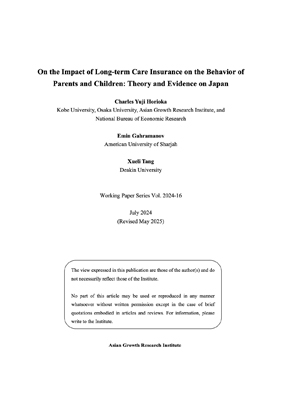On the Impact of Long-term Care Insurance on the Behavior of Parents and Children: Theory and Evidence on Japan

| 執筆者 | Charles Yuji HORIOKA, Emin GAHRAMANOV, Xueli TANG |
|---|---|
| 発行年月 | 2024年 6月 |
| No. | 2024-16 |
| ダウンロード | 387KB |
内容紹介
The purpose of this paper is to conduct a theoretical and empirical analysis of how the behavior of parents and children is affected by the presence or absence of long-term care insurance (LTCI). In our empirical analysis, we use micro data from the Japan Household Panel Survey on Consumer Preferences and Satisfaction (JHPS-CPS), formerly known as the Preference Parameter Study, conducted by Osaka University. Japan is an interesting case to analyze because a public LTCI system was introduced there in 2000. Our analysis shows that, in the case of Japan, if parents are eligible for public LTCI benefits, their children will be less likely to be their primary caregiver and that this, in turn, will reduce their children’s perceived likelihood of receiving a bequest from them. This result implies that bequests are selfishly or strategically motivated (i.e., that parents leave bequests to their children in order to elicit care from them) and that the introduction of a public LTCI system will reduce the likelihood of children providing care to their parents and through this channel reduce their perceived likelihood of receiving a bequest from them.
